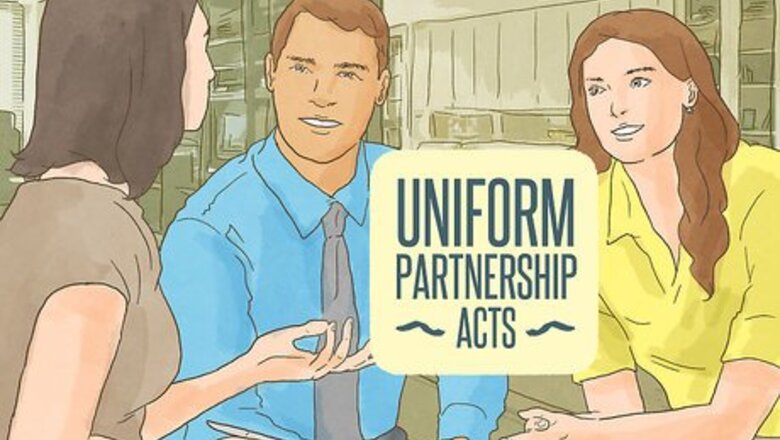
views
Executing a Partnership Agreement
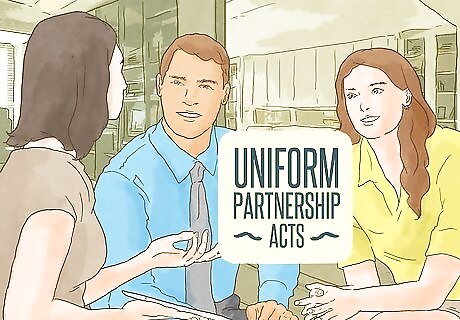
Determine what the agreement will cover. A partnership agreement is a legal contract entered into when a group of individuals go in together on a joint venture. In this situation, the joint venture is buying a home. The partnership agreement will dictate how you and your friends will be required to interact when it comes to purchasing and living in the home. While you and your friends can agree to almost anything, if you fail to address certain issues, state laws (usually called Uniform Partnership Acts) will fill in the blanks for you. To avoid conflict, address as many hypothetical scenarios you and your friends can think of. No issue is too small or too big.

Analyze how the home search will unfold. One of the first things your agreement should address is how you and your friends will decide on a home to purchase. This might include provisions about what you are looking for in a home and what is a deal breaker. In addition, think about how you and your friends will agree on a mortgage loan. These issues need to be worked out ahead of time in order to avoid disputes down the road. For example, make it clear if everyone wants a pool, a backyard, a porch, or a large kitchen. Furthermore, make it clear if there are things you do not want (e.g., anything less than a four bedroom home). With mortgages, decide whether everyone wants a fixed-rate or variable loan. Discuss how much you are willing to take in a loan and what is too much.

Define how title will be held. Normally, when someone purchases a home, they take title in fee simple absolute or in tenancy by the entirety. Common with married couples, tenancy by the entirety is a joint tenancy whereby one spouse takes ownership over the other spouse's share upon that spouse's death. However, you and your friends should consider agreeing to take title as tenants in common. As tenants in common, every partner will have an equal right to possess and use the whole property while maintaining the ability to transfer their interest to anyone they want.

Decide how future transfers will be handled. If you and your friends take ownership as tenants in common, you will need to agree on how transfers will occur. If you do not, you or any of your friends could transfer their share of the property to anyone whether you know or like them. If an owner wants to sell, consider providing every other owner with a right of first refusal. If you agree to a right of first refusal, you give any of the other owners the right to buy the seller's interest before anyone else can. This way, if you and your friends desire, you can keep the property in your circle instead of letting someone else in.

Agree on how an owner's interest will transfer at death. In addition to determining how one owner can sell their interest, you should also decide how an owner's interest will transfer at death. With an tenancy in common, an owner's interest will be passed down to heirs or beneficiaries upon their death. If you want to avoid this, you can agree to allow the other owners to buy out whoever inherits the property.
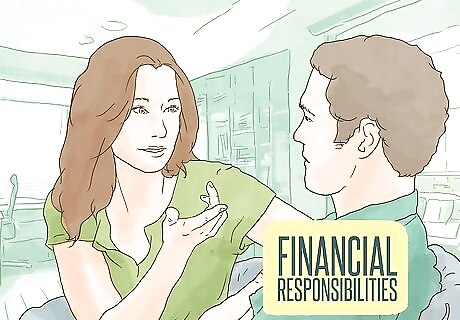
Spell out the financial obligations of each owner. When you and your friends sign a mortgage, each of you will be jointly and severally liable for the debt. This means that if one friend fails to make a payment, you and the other friends will be responsible for picking up the slack. If you and your friends fail to make timely payments, the lender (i.e., the bank) can come after any one of you to recoup their loss. For this reason, consider stipulating that if one owner fails to make a certain number of payments, that owner will be required to sell their share of the property to every other owner. If you do this, you should agree to have an appraiser determine the value of that person's share.
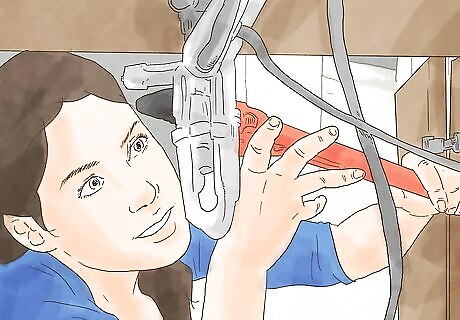
Agree on who is responsible for maintenance. To avoid problems and disputes, make sure you address who will be responsible for the home's maintenance. This agreement should include as many responsibilities as possible. For example, explicitly lay out who will mow the lawn, take out the trash, pay utility bills, fix broken windows, and any other seemingly mundane responsibility you can think of. The more responsibilities addressed the smoother things will run when you own the home with your friends.
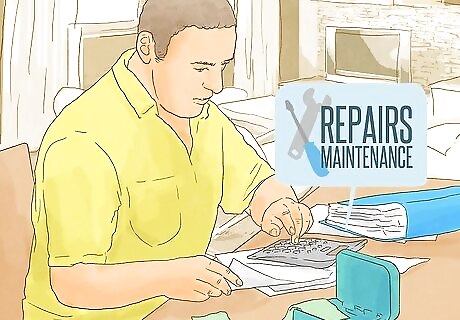
Decide whether funds will be held in a fund for repairs. When you and your friends own a home, things will inevitably break down and repairs will have to be made. With this in mind, decide how funds will be collected to pay for these repairs. While you could collect money from everyone in an equal amount as the bills come in, you may want to consider putting money aside for the repairs. In doing this, you and every other owner will pay a certain amount monthly into an account. The account will then be accessed when repairs need to be made. In utilizing a joint account for the purpose of making repairs, you will ensure money is available when you need it. In addition, you might put it in an interest bearing account where your money can grow so long as it is not needed.
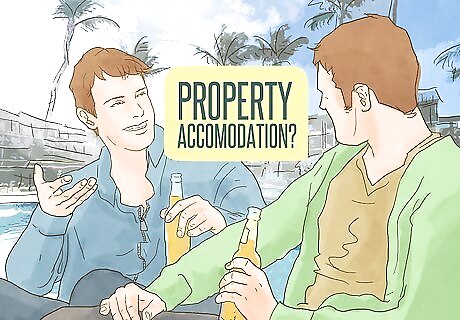
Determine how to allocate the use of the property. One of the most contested issues will likely be who gets to use the property when. You and your friends will all want to use it at different times and you want to try and accommodate everyone as best as possible. For this reason, you and your friends need to agree on how use will be allocated. One possibility is to allow open access to any owner at any time. This may be logical if there are only a few owners who don't mind sharing the property, even if they are there at the same time. Another possibility is to create a yearly use schedule. Using this method, you and your friends will get together once a year and agree on when each owner will get to use the property. For example, you could split it up by months. You could also determine if there are special dates one owner may want the property (i.e., holidays, birthdays, or anniversaries). No matter how you split it up, agree to a method ahead of time.

Choose who can have access to the property. Address who can access the property apart from you and the other owners. A lot of times, one of your friends may want to allow their friend or family member to use the house, even though the other owner might not be present. You and the others will need to decide how you will handle these requests. One option is to allow open access to the home as long as one of the owners knows the person using the home. This might be a good choice if you trust your friends and the company they keep. Another option may be to only allow access to the owners and their families. This is a good option if you want to keep access limited for whatever reason.
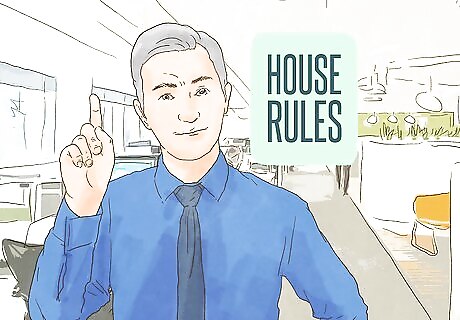
Lay down house rules. Before you purchase a home with friends, you need to agree on how the house will be used. Make sure you cover as many scenarios as you can think of. Do not leave any detail out. For example, will you allow owners or their guests to bring pets, will you allow smoking in or around the home, and will you allow parties?

Agree on how decisions will be made. Towards the end of your partnership agreement you should lay out how decisions will be made among you and your friends. If something comes up that is not covered by your agreement, how will you decide how to handle it? One option would be by requiring a unanimous vote. This may be viable if you are part of a small ownership group and you all agree relatively easily. However, it may be difficult if you are part of a large group. If you are part of a larger ownership group, you may require a majority vote. In this scenario, whichever option gets the most votes would be implemented.
Getting a Loan

Understand how the mortgage will work. When multiple individuals sign a mortgage agreement, each one of you will be joint and severally liable. If you or someone else fails to pay, the others will have to pick up the slack and make the full payment. You and the other potential co-owners need to have a serious conversation about everyone's financial situation. Make sure everyone understand the responsibility that comes with signing a mortgage together.
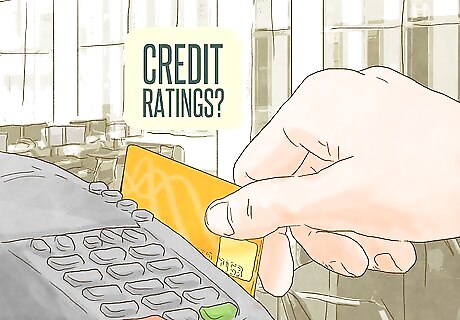
Verify everyone's credit. When a lender looks into your qualifications to get a loan, the lender will use everyone's credit ratings. If even one person in your group has bad credit, your interest rate may rise and the amount you qualify for might go down. Make sure everyone in your group has an acceptable credit rating that will not jeopardize your ability to get a reasonable mortgage. A small interest rate increase (for example 4.5% vs. 4%) can make a big difference in your monthly payments and how much interest you pay over the life of the loan.
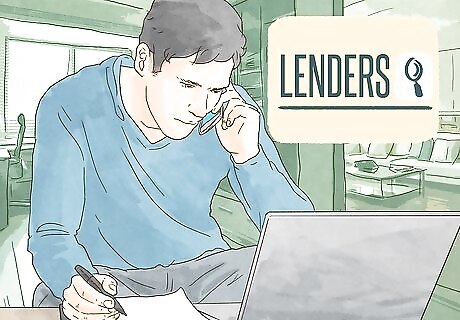
Shop for lenders. Once you have a good group of individuals you feel confident investing in a home with, start shopping for lenders. Different lenders will offer different interest rates, different loan amounts, and different fees. Shop around in accordance with your partnership agreement for the best deal possible. In addition, you can always negotiate with lenders to help get a better deal. Loans will usually either be fixed rate or variable rate. A fixed rate loan has an interest rate that stays constant throughout the life of the loan. If you think that rates are low and may rise in the future, you might consider taking a fixed rate mortgage. On the other hand, a variable-rate (or ARM) mortgage has an interest rate that fluctuates over time. Variable-rate mortgages can help you afford a home you may not be able to purchase with a fixed-rate mortgage, but you have to be prepared for sudden increases in monthly payments. Every loan has certain fees associated with it. For example, you will usually have to pay "points", which are fees paid to the lender depending on the interest rate you have. Usually, the lower the interest rate, the more points you pay. Other fees will include origination, underwriting, broker, and closing fees. Make sure you shop around and find the best deal.

Get preapproved for a mortgage. When you find a lender and mortgage type everyone can agree to, you will want to get preapproved for the loan. When you get preapproved, the lender is verifying your ability to take out a loan for a certain amount. Preapproval will usually last for a certain period of time (generally 90 days). Your preapproval letter can be used to show sellers you are serious about purchasing the home. It will also give sellers the peace of mind that you can make a serious offer.
Purchasing a Home

Hire a professional. When all of your ducks are in a row, you and your friends can start searching for homes. If everyone is busy, you might want to hire a professional to search for you. Real estate agents are relatively easy to find. However, not everyone is created equal and some are better than others. When you talk with potential agents, ask whether they represent buyers or sellers, what neighborhoods they are familiar with, how many clients are they currently working with, and if their license is still valid and in good standing.
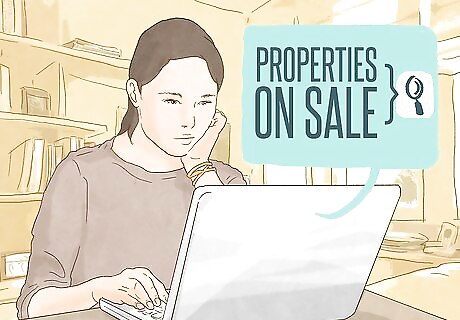
Search for available properties. If you hire a professional, they will talk with you and your friends about what you are looking for. Once the agent has a good idea of what everyone wants, the agent will go out and find properties for you. If you are searching as a group, start by looking at neighborhoods that fit your needs and budget. While you can go out and search in-person, you should consider using the internet to help you.
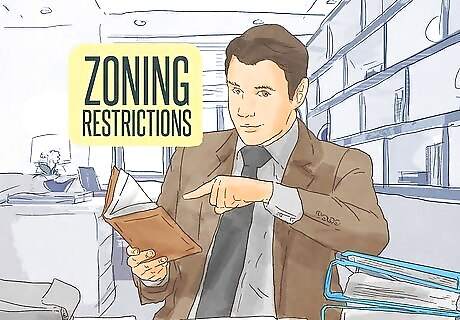
Check residential restrictions. Be aware of restrictions in some neighborhoods regarding how many people can live in a home and other zoning restrictions there may be. For example, every county will have zoning laws dictating what type of homes and businesses can be located in particular places. Some zoning rules restrict how many people can live in a single-dwelling home and how many parking spaces a home can have. Before you put an offer in on a home, be sure your use of the home will not be unreasonably restricted.
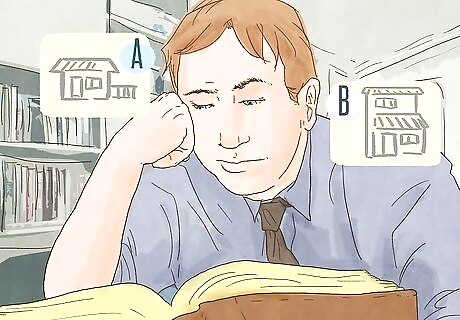
Look at comparable homes in the area. Before you make an offer on a home, determine how much you and your friends will be willing to pay. The best way to do this is to look at comparable homes in the same neighborhood. By searching public records, you will be able to determine what homes sold for in the past. Using that information you will be able to determine what your dream home is worth. To search public records, go to the county recorder's office where the property is located. From there, ask to search public land records, which will include deeds and other information about properties.
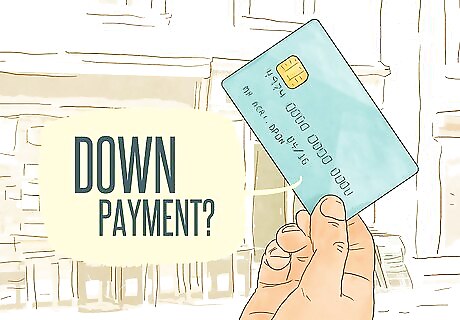
Determine how much of a down payment you will need. Most sellers (and lenders) will require you to make a down payment, with the remainder of the purchase price eligible for a loan. As a rule of thumb, most down payments are between 10% and 20% of the total purchase price. For example, if the home you are looking at costs $200,000, you can expect to have to make a down payment of between $20,000 and $40,000. Once you know what your down payment would be, you and your friends need to gather the funds. Your partnership agreement should discuss how this will be done.

Make an offer. When you find your dream home, make quick moves and submit a bid. Your initial offer should reflect the value you have placed on the home and how much you can afford. If you really want the home, do not lowball. Think of creative ways to negotiate a deal. For example, ask if the seller will leave the kitchen appliances in the home if you meet his or her purchase price. You could also ask the seller to remove furniture and offer a lower price.

Close the deal. When an agreement is made, you will work to close the deal and take possession of your new home. Before and during the closing period, you will need to get your mortgage loan finalized and put in place. Since you were preapproved, this process is as simple as calling your lender. The purchase money will be placed in an account and transferred to the seller at closing. Once the purchase price has been paid, you and your friends will take possession of your new home.



















Comments
0 comment